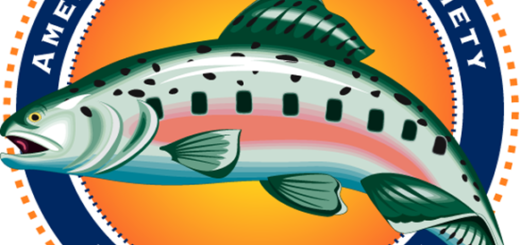2023 Officer elections
Voting is now open for the 2023 elections. This year we have two candidates for WDAFS Vice President and Student Representative and one candidate for Secretary-Treasurer. Candidate biographies are included below. Voting is open until April 21.
To vote, please visit: https://forms.gle/Vm6PhpoTrLjE9Po47
WDAFS Vice President Elect Candidates
Tim Copeland (Idaho Fish & Game)
 I am honored to be nominated to serve the Western Division AFS as Vice President. AFS has played a vital role throughout my career and I have long been an active member of the Idaho Chapter. The Western Division Excom was of great help to the Idaho Chapter as we experienced the trials and tribulations caused by the pandemic. The recent past officers (Dan Dauwalter, Todd Pearsons, Travis Rehm) and the current Excom have been great to work with and they set a wonderful example for service to our profession. I would like to follow their lead and give back to the Division.
I am honored to be nominated to serve the Western Division AFS as Vice President. AFS has played a vital role throughout my career and I have long been an active member of the Idaho Chapter. The Western Division Excom was of great help to the Idaho Chapter as we experienced the trials and tribulations caused by the pandemic. The recent past officers (Dan Dauwalter, Todd Pearsons, Travis Rehm) and the current Excom have been great to work with and they set a wonderful example for service to our profession. I would like to follow their lead and give back to the Division.
I have been fortunate to make a career doing something I love. My first fisheries job was as an eight-month seasonal employee at a fish hatchery in 1988, just after my undergraduate degree at Penn State. The next year I got a permanent job as a fisheries management technician with the Pennsylvania Fish & Boat Commission. My main tasks were sampling trout streams, lakes, reservoirs, and a large river. I loved the field work but realized I needed a masters degree if I wanted to advance my career. I went back to Penn State while continuing to work. After obtaining my MS, I decided I liked the taste of research and went on to earn a PhD at Virginia Tech. As I was wrapping up my dissertation, a research job opening with Idaho Fish & Game came my way. That was 19 years ago and I am still in Idaho, doing what I love and loving what I do.
My present duties are to oversee IDFG’s wild salmon and steelhead monitoring program. The program’s work includes snorkel surveys, running traps and weirs, counting salmon redds, and other sampling activities, often in the most remote and beautiful parts of Idaho. I started my time with IDFG doing this work and was eventually asked to supervise the program. It is a pleasure to work with young staff, who are very passionate about what they do. The biologists I work with at IDFG are an energetic group that has produced 18 peer-reviewed publications in the last 5 years. The monitoring program is a large group of more than 20 full-time staff, plus many seasonals. With the size of the program comes a fair bit of responsibility. To improve my leadership and administrative abilities, in 2021 I became a Certified Public Manager®, which involved a rigorous year-and-a-half training commitment. Also as part of my role, I interact with people from a number of state, tribal, and federal agencies. For example, I represent my agency on the Steering Committee of the Pacific Northwest Aquatic Monitoring Partnership, which is a forum for inter-agency collaboration. A fun part of my job is collaborating with students and professors at the University of Idaho and I occasionally serve on graduate student committees. At this point in my career, my goal is to provide opportunities and guidance to others who are building their own careers.
AFS has been a huge part of my professional life. Participation in our professional society was encouraged and emphasized by my graduate advisors. I have been a member of AFS since 1990 in four different chapters. As a student, I was the newsletter editor for the Southern Division AFS and the President of the Virginia Tech Chapter AFS. I became a Certified Fisheries Professional in 2009. I joined the Idaho Chapter in 2004 and have been active on the Anadromous Fish, Public Education, and Mentoring committees. I also served on the NAJFM Best Paper committee several times. I have been part of the Idaho Chapter Excom as Anadromous Fish Committee chair, as Secretary/Treasurer, and as Vice President/President Elect/President. Currently I am the Idaho Chapter’s Past President and have been the Society’s Audit Committee chair since 2019. Those were great experiences. I would like to see those benefits continue for the enjoyment of students and young professionals.
As I mentioned at the beginning, the Western Division provides important support to us as AFS members. This was driven home to me as the pandemic rolled on during 2020. I was responsible for planning our 2021 annual meeting and it was not clear what the path forward might be for the Idaho Chapter. Through the WD Excom, I was able to discuss the challenges with others facing those same problems. The Division officers offered great support and engaged with AFS staff to give us access to expertise and tools. Despite the unfamiliar virtual format, the 2021 Idaho Chapter meeting set records for attendance and fundraising. That would not have been possible without help from the Western Division and I feel obligated to pay that forward.
If elected, I would emphasize resilience and relevance with the respect that the Western Division deserves. Resilience implies adapting to environmental and social changes to serve members better and to be sustainable into the future. Relevance means connecting students, young professionals, and our members to the resources they need. We must connect more broadly to thrive and be more successful. I would also emphasize respect for the personal and professional interactions that Western Division promotes. The Division provides great support, which should be highlighted; but what could be done better? The Division’s good work is done primarily by the chapters and committees, which implies two primary tasks for leadership. First, the needs of the chapter presidents and committee chairs must be understood and their work facilitated; communication with them is a top priority. Second, coordination and planning with the host chapter of the Division’s annual meeting is vital because the chief way the Division brings people together is in the forum of the annual division meeting. Additionally, the Division’s business must be conducted in an efficient and transparent manner. As a chapter officer and Audit Committee chair, I promoted financial sustainability and transparency, and would continue that emphasis. I am excited for the opportunity to serve the Western Division.
Rob Titus (California Department of Fish and Wildlife)
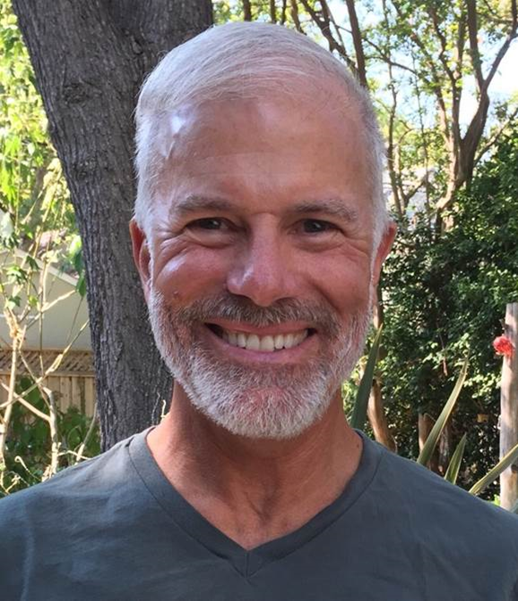 BACKGROUND
BACKGROUND
Greetings, Western Division membership! My name is Rob Titus, and I am running for Vice President of the Western Division of AFS. I am excited about running for this post, but before I talk more about why I would like to serve the Western Division in this capacity, I would like to tell you a little bit about myself, my background, and some of the things that have influenced my interest in fisheries and aquatic conservation in general.
Where I have lived and the activities I have engaged in while living in those places have shaped my curiosity and interest in nature and natural resources. Many of us share a similar personal history in this regard. I am a life-long westerner, having grown up literally on the banks of the Truckee River in Reno, Nevada, and later relocating to Northern California where I have lived and worked all my adult life with the exception of 6 years attending graduate school in Sweden. I grew up hunting, fishing, and camping with my dad and older brother, which put me outside exploring and gaining an appreciation for nature through a variety of experiences, both consumptive and not. These early experiences were such a defining part of my world view and value system and formative in developing personal connections to the outdoors and outdoor recreation, to natural environments and the resources they produce, and to conservation as a utilizer of those resources. My family’s move to northern California greatly expanded my horizons as I began to explore the ecological diversity that defines California. So, stage set to go to university to become a fishery biologist, right? Nope! As a teenager, music had become my other great passion in life and I started university as a trombone performance major. Go figure! As much as I still love playing and being engaged with music, I discovered that the jazz life was not for me and my passion for the outdoors and biological conservation won out instead. With this major shift in educational goal, I had a lot of learning to do, which continued through the completion of my Bachelor’s and Master’s work in biological sciences at Sacramento State University, training in limnology at Uppsala University in Sweden, and my doctorate work on brown trout at Uppsala.
I started my professional career as a fishery biologist when I completed my Bachelor’s degree, doing stints with California Department of Fish and Wildlife (CDFW), California Department of Water Resources, and U.S. Bureau of Reclamation working in areas ranging from wild trout fisheries, fish passage, and water quality and fishes in the San Francisco Bay-Delta system. Following my training in Sweden, I returned to California for a post-doc position at the University of California, working at both the Sagehen Creek Field Station on trout ecology and on California coastal steelhead. That work groomed my transition into a career position with CDFW, which continues today. My many years of work with the State has been diverse, typically addressing long-term issues associated with instream flows and temperatures, water rights, fish population and community monitoring, scale and otolith applications for age-and-growth and stock identification, sport fishery monitoring and research, endangered species conservation, and more. My learning continues not only through my professional engagement, but also through my secondary career as a part-time lecturer and adjunct professor in biological sciences at Sac State. In this role, I teach courses in fisheries, ecology, and natural resource conservation, mentor graduate students, and recruit graduates into our field.
INVOLVEMENT IN AFS
For many years, my involvement in AFS was focused primarily on attending and participating in Cal-Neva Chapter annual meetings and joint meetings with the Western Division when Cal-Neva was co-hosting. My participation included giving presentations and organizing and moderating technical sessions. As a fisheries supervisor with CDFW, I have consistently encouraged and supported staff membership and participation in AFS and worked with staff to develop presentations and participate in annual meetings. Membership recruitment and supporting early career scientists in their professional development through AFS has long been a priority of mine in my interface with the Society. I was greatly honored by the Cal-Neva Chapter in 2014 when I received the Distinguished Professional Achievement Award for my dual role and accomplishments as an agency scientist and educator in fisheries conservation. More recently, I really stepped up my involvement in AFS by serving as President of the Cal-Neva Chapter. My term included co-chairing the joint AFS-TWS annual meeting in Reno in 2019 – hailed as the largest assembly of fish and wildlife professionals and students in the history of mankind! I then helped guide Cal-Neva’s transition from being heavily focused on face-to-face interactions into conducting business in a virtual world with the unexpected and sudden move into the COVID-19 lockdown. While a lot of work on top of my other professional obligations, my service to Cal-Neva as President, and all the interaction with folks at both the Division and Society level, really stands out as an amazingly enriching highlight in my career.
QUALIFICATION AND VISION
I am truly honored to be considered as a nominee for Vice President of the Western Division. Serving as president of any organization requires leadership skills and vision. I feel qualified to serve in a leadership role based on nearly 20 years of experience supervising large programs at CDFW, nearly 25 years of teaching and mentoring students at Sac State, and previously serving as President of a non-profit cultural organization for 3 years. Of course, my greatest qualification is my recent experience as President of one of the largest chapters in AFS. While there were times when I felt like I was just trying to hang on for the ride, in the end we accomplished great things for the membership and toward accomplishing the mission of AFS, all of which was evidenced in being selected as the Outstanding Large Chapter at both the Western Division and Society levels for 2019.
My vision for serving as Vice President of Western Division and on through the 4-year presidential cycle focuses on two things: continuity and strategic recruitment. A big part of what I would focus on would be maintaining continuity with the on-going efforts of the Division as represented in the work of recent presidents, officers, student representatives, and committee chairs. That foundation is huge and has momentum upon which the Division’s evolving priorities can be developed. Fisheries advocacy, scientific representation, promotion of diversity and inclusion, and providing a platform for fellowship are all essential elements to the work of the Division in meeting the mission of AFS. Continuing to optimize our efforts in these areas, with an emphasis on supporting our member chapters, would represent a major portion of my work.
Recruitment also certainly falls within the base function of the Division’s Executive Committee. I have split it out here, though, because of its essential importance in two regards. The first is the obvious one: without the continuous recruitment of new and diverse members, we are a Society on a dead-end track. Dead end not only in terms of sheer numbers, income, and ability to carry out programs, but also dead end in terms of my second point, which is maintaining societal relevancy. The American Fisheries Society serves a critical function of serving as a bridge between the resource, the science that we use to study and manage those resources, and the rest of society that is both knowingly and unknowingly linked to those resources. As our society and its value systems evolve, so must AFS in the manner in which we communicate and conduct outreach to recruit and retain members, stimulate participation, incorporate new thinking and values, and continue to move our mission forward. My pitch would be to strive to reach all sectors of society to recruit and include the perspectives and talents of a growing diversity of persons that are available to enter our profession. Thank you for your consideration!
WDAFS Secretary -Treasurer Candidate
Laura Burckhardt (Wyoming Game & Fish Department)
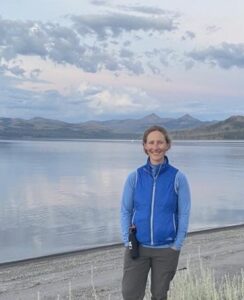 I am seeking election for a second term as in the office of SecretaryTreasurer. During my first term as Secretary Treasurer, I have improved the reporting and tracking of financial transactions, streamlined account and officer transitions, identified and received missing profits, and am working to better document the procedures for the office. In my second term, I plan to finalize the account simplification and officer transition process and the documentation associated with the procedures and process for future officers in the Secretary Treasurer position.
I am seeking election for a second term as in the office of SecretaryTreasurer. During my first term as Secretary Treasurer, I have improved the reporting and tracking of financial transactions, streamlined account and officer transitions, identified and received missing profits, and am working to better document the procedures for the office. In my second term, I plan to finalize the account simplification and officer transition process and the documentation associated with the procedures and process for future officers in the Secretary Treasurer position.
Throughout my career, I have found participation in AFS to be very rewarding and have enjoyed being a part of the community within the Arizona-New Mexico, Montana, Dakota, and Colorado-Wyoming Chapters. I am currently an Aquatic Habitat Biologist with the Wyoming Game and Fish Department focusing on stream restoration and protection projects in the Cody area. I am a certified fisheries biologist and have held fisheries management and research positions in Montana and Arizona. I also spent many years working for an environmental consulting firm on fisheries research and energy development projects across the West. I grew up in Wyoming, completing my bachelor’s degree at the University of Wyoming and my Master’s degree at the University of Arizona. Throughout my career, I have found that the most rewarding work I have done is in habitat protection and restoration, and sharing my love of nature with kids.
WDAFS Student Representative Candidates:
Rachel Valeria (University of Idaho)
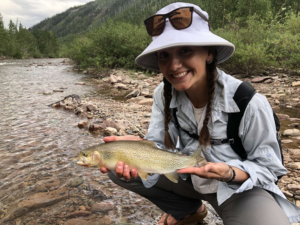 My name is Rachael Valeria and I am currently a masters student in the Department of Biological Sciences at University of Idaho. I graduated with a bachelors in Fisheries and Aquatic Sciences from University of Wisconsin – Stevens Point. My participation in the fisheries field was largely established by my previous involvement in the American Fisheries Society – UWSP Subunit and North Central Division of the American Fisheries Society. One of my greatest challenges and fears used to be public speaking in front of large groups. I knew that the only way to overcome this fear was to have leadership experience in a higher role. I ran for and accepted the president position of our campus chapter of the American Fisheries Society to take on the challenge of managing a society, leading weekly meetings, organizing field sampling events, and representing our society at the state and region level. For the last couple of years, I worked fisheries positions out of Idaho/Montana working with Bull Trout, Arctic Grayling, and Westslope Cutthroat conservation and habitat. Throughout my undergrad, I developed an increased fascination in aquatic invertebrates and their relationship with fish and the surrounding riparian habitat and aquatic environment. This led me to accept my masters position researching the thermal tolerance of the Western Ridged Mussel and their host fish, Sculpin species. I would like to be more involved in the Western Division of the American Fisheries Society, as well as its students, and I think this would be a great opportunity to do so.
My name is Rachael Valeria and I am currently a masters student in the Department of Biological Sciences at University of Idaho. I graduated with a bachelors in Fisheries and Aquatic Sciences from University of Wisconsin – Stevens Point. My participation in the fisheries field was largely established by my previous involvement in the American Fisheries Society – UWSP Subunit and North Central Division of the American Fisheries Society. One of my greatest challenges and fears used to be public speaking in front of large groups. I knew that the only way to overcome this fear was to have leadership experience in a higher role. I ran for and accepted the president position of our campus chapter of the American Fisheries Society to take on the challenge of managing a society, leading weekly meetings, organizing field sampling events, and representing our society at the state and region level. For the last couple of years, I worked fisheries positions out of Idaho/Montana working with Bull Trout, Arctic Grayling, and Westslope Cutthroat conservation and habitat. Throughout my undergrad, I developed an increased fascination in aquatic invertebrates and their relationship with fish and the surrounding riparian habitat and aquatic environment. This led me to accept my masters position researching the thermal tolerance of the Western Ridged Mussel and their host fish, Sculpin species. I would like to be more involved in the Western Division of the American Fisheries Society, as well as its students, and I think this would be a great opportunity to do so.
Meredith Leigh Journey (University of Wyoming)
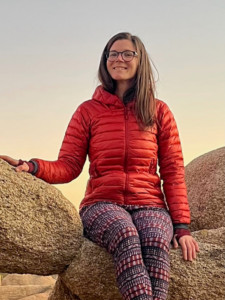 I started my fisheries career and education at the University of Washington earning my master’s degree in Aquatic and Fishery Sciences. From there I moved to a Research Scientist position at the Northwest Fisheries Science Center in Seattle, WA. My work there focused on mechanisms and drivers of juvenile salmon growth in the Salish Sea, Columbia River Estuary, and Northern California Current. Mostrecently, I moved to Laramie, WY to start a doctoral program at the University of Wyoming. My current research interests include assessing the impacts of climate change on trout and zooplankton assemblages of high alpine lake ecosystems in the Wind River Range. I have attended, presented, and volunteered at both regional chapter and annual AFS meetings since the start of my fisheries career. Through these events I have made invaluable connections and broadened my exposure to the many diverse fields of fisheries research. As a student representative I will work to provide social and networking opportunities to all students, including those from under-represented and lesser-funded universities and states within the
I started my fisheries career and education at the University of Washington earning my master’s degree in Aquatic and Fishery Sciences. From there I moved to a Research Scientist position at the Northwest Fisheries Science Center in Seattle, WA. My work there focused on mechanisms and drivers of juvenile salmon growth in the Salish Sea, Columbia River Estuary, and Northern California Current. Mostrecently, I moved to Laramie, WY to start a doctoral program at the University of Wyoming. My current research interests include assessing the impacts of climate change on trout and zooplankton assemblages of high alpine lake ecosystems in the Wind River Range. I have attended, presented, and volunteered at both regional chapter and annual AFS meetings since the start of my fisheries career. Through these events I have made invaluable connections and broadened my exposure to the many diverse fields of fisheries research. As a student representative I will work to provide social and networking opportunities to all students, including those from under-represented and lesser-funded universities and states within the
Western Division of the American Fisheries Society. I will encourage students at all stages in their education, from different universities and diverse fields, to interact and learn from one another by organizing, hosting, and widely advertising the annual student colloquium. I will also work to make events accessible and beneficial to students in all stages of their education from early undergraduate to the final stages of doctoral degrees. To achieve the above goals, I will ensure that all opportunities for volunteering, funding, and scholarships are communicated to my fellow students timely and often. As a student with both professional and academic experience in fisheries I am excited to bring a unique perspective and background to the role of student representative. Thanks for considering me for your Western Division student representative.

